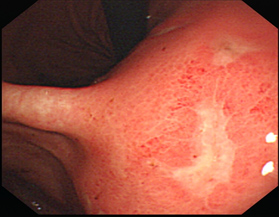Peptic ulcer disease (PUD) is a common disease of the digestive system. It usually occurs in the stomach and proximal duodenum. The lifetime risk for developing a peptic ulcer is approximately 10%. Peptic ulcer disease is caused by a bacterial infection (Helicobacter pylori) in the stomach or the use of certain painkillers (nonsteroidal anti-inflammtory drugs – NSAIDs) and aspirin/ other anti-platelet agents. Patients with peptic ulcer can be asymptomatic. If symptoms occur, they may include a burning pain in the middle or upper stomach between meals or at night, bloating, heartburn, nausea or vomiting. In severe cases, symptoms can include hematemesis, coffee ground vomiting and melena, weight loss, severe pain in the mid to upper abdomen. Individuals with PUD are at risk of developing complications such as haemorrhage, perforation and obstruction, and mortality among patients with these complications is high. Oesophagogastroduodenoscopy (OGD) is the preferred diagnostic test in the evaluation of patients with suspected PUD.




